 Collected Fragments of ENNIUS (c. 239c. 169 BC)
Collected Fragments of ENNIUS (c. 239c. 169 BC)  Contents
Contents  Delphi Classics 2018 Version 1
Delphi Classics 2018 Version 1  Browse Ancient Classics
Browse Ancient Classics 





 Collected Fragments of QUINTUS ENNIUS
Collected Fragments of QUINTUS ENNIUS  By Delphi Classics, 2018
By Delphi Classics, 2018
COPYRIGHT
Collected Fragments of Ennius First published in the United Kingdom in 2018 by Delphi Classics. Delphi Classics, 2018. All rights reserved. No part of this publication may be reproduced, stored in a retrieval system, or transmitted, in any form or by any means, without the prior permission in writing of the publisher, nor be otherwise circulated in any form other than that in which it is published.
ISBN: 978 1 78656 405 4 Delphi Classics is an imprint of Delphi Publishing Ltd Hastings, East Sussex United Kingdom Contact: sales@delphiclassics.com  www.delphiclassics.com
www.delphiclassics.com
The Translations

Archaelogical remains at Rudiae Quintus Ennius was born at Rudiae, formerly a small town located near modern Lecce in the heel of Italy, ancient Calabria.

The amphitheatre at Rudiae
THE COLLECTED FRAGMENTS

Translated by E. H. Warmington for the Loeb Classical Library Widely regarded as the father of Roman literature, Quintus Ennius (239169 BC) was instrumental in creating a new Roman literary identity, his works going on to inspire major developments in Roman religion, social organisation and popular culture. In 204 BC he was brought to Rome in the entourage of Cato and he took up residence on the Aventine Hill, where he soon found work. Fluent in his native Oscan as well as Greek and Latin, Ennius became one of the first teachers to introduce Greek learning to the Roman upper classes through public readings of important Greek texts.
Though largely overshadowed today by Virgils later epic The Aeneid , Ennius was revered by his contemporaries for producing the first true Latin epic poem. Composed in fifteen books, later expanded to eighteen, The Annals covered Roman history from the fall of Troy in 1184 BC down to the censorship of Cato the Elder in 184 BC. It was the first Latin poem to adopt the dactylic hexameter metre used in Greek epic and didactic poetry, leading it to become the standard metre for these genres in Latin poetry. The epic also became a school text for Roman schoolchildren, eventually supplanted by The Aeneid . The Annals gave Roman epic its canonical shape and pioneered many of its most characteristic features, inspiring the later works of Virgil, Ovid and Statius. Though only 600 lines survive today, Ennius is recognised for domesticating Greek epic and drama, elevating Roman literature to the same sphere as his Greek models.
Ennius also pursued a wide range of literary endeavours and was successful in almost all of his literary forms. His tragedies were long regarded as classics of the genre, while other major texts included philosophical works in prose and verse, epigrams, didactic poems, dramas on Roman themes and occasional poetry that later influenced the development of satire by Horace and Juvenal. Ennius works only survive in fragments, recorded by later writers and painstakingly collected over the centuries by classical scholars, who have conjectured and agonised over the positioning and understanding of the precious remnants of Romes first epic poet. In spite of their fragmentary form, the preserved texts afford us a rare understanding of the importance of Ennius work and its immeasurable impact on the history of Latin literature.  Double herm featuring a portrait believed by some to be of Ennius, Ny Carlsberg Glyptothek CONTENTS
Double herm featuring a portrait believed by some to be of Ennius, Ny Carlsberg Glyptothek CONTENTS  The Patrician Torlonia bust thought to be of Cato the Elder
The Patrician Torlonia bust thought to be of Cato the Elder  A first-century AD bust of the orator Cicero in the Capitoline Museums, Rome Cicero highly regarded Ennius works and is one of the key authors to have preserved many of his famous quotations. Prelude. Prelude.
A first-century AD bust of the orator Cicero in the Capitoline Museums, Rome Cicero highly regarded Ennius works and is one of the key authors to have preserved many of his famous quotations. Prelude. Prelude.
From the Sack of Troy to the Death of Romulus The first line; invocation of the Muses: Varro: In Ennius there is... Muses, who with your feet beat mighty Olympus; by Olympus the Greeks mean the sky. Exhortation to readers: Probus: As for the neuter gender the syllable is short.... Ennius in the first book for my subject and my poem shall have renown among the peoples of Italy. Homer, seen by Ennius on Mount Helicon in a dream, was the source of inspiration: Fronto: Homers instructress was Calliope; Ennius instructors were Homer and Sleep. Marcus Aurelius to Fronto: And now I pass to our poet Ennius, who you say began to write after sleeping and dreaming.
But surely if he had not been roused out of his sleep he would never have told the tale of his dream. Fronto writes to Marcus Aurelius: If ever, Fettered in soft calm sleep as the poet says, I see you in dreams, there is no time when I do not embrace you and fondly kiss you... this is one proof of my love, which I take from the Annals, a poetic and dreamy one indeed. Homer appears: Cicero: When Ennius had dreamed, this is what he told of it Homer the poet appeared at my side. Opening of Homers speech: Cicero: Unless indeed we choose to believe that Ennius, merely because he dreamed it, did not hear the whole of that famous speech O loving kindness of thy heart.... as well as he would have heard it if he had been awake.
Homer explains to Ennius some principles of life: Varro These two, sky and earth, correspond with life and body. The wet and cold masses form the earth, whether we assume that visus Colonna, Merula coll. Aen. II, 270, fortasse recte. The feather-furbished tribe is wont to be delivered of eggs, not of life, according to the words of Ennius and after that time life itself comes to the chicks by a gods will; or, according to Zenon of Cition, that the seed of living things is fire and this is their life and soul. 1112 Varro: Right therefore is the statement of...
Next page
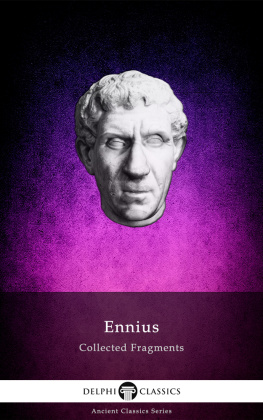


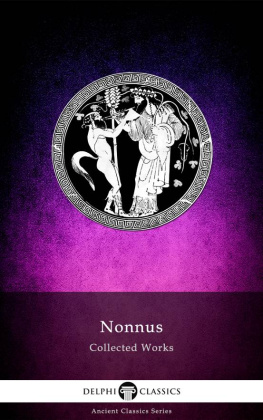
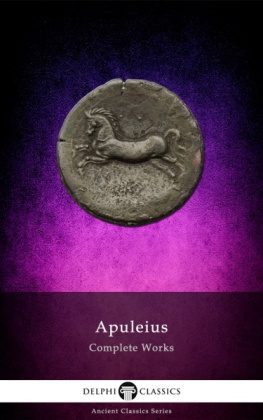
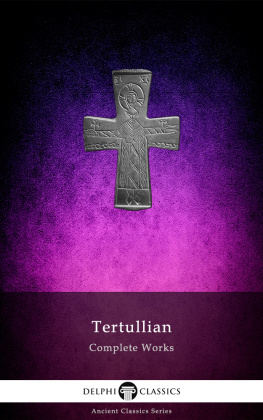
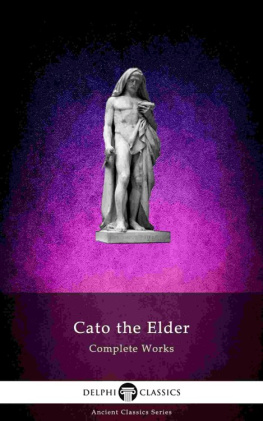
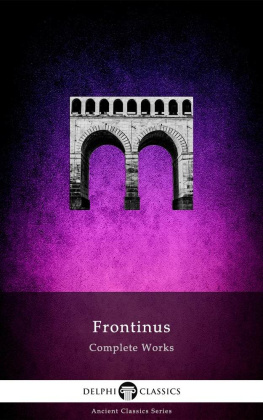
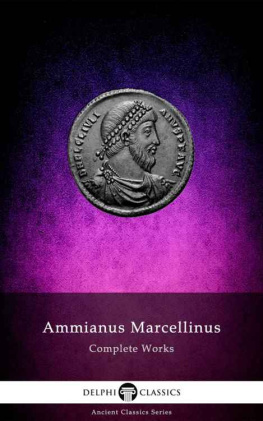
 Collected Fragments of ENNIUS (c. 239c. 169 BC)
Collected Fragments of ENNIUS (c. 239c. 169 BC)  Contents
Contents  Delphi Classics 2018 Version 1
Delphi Classics 2018 Version 1  Browse Ancient Classics
Browse Ancient Classics 





 Collected Fragments of QUINTUS ENNIUS
Collected Fragments of QUINTUS ENNIUS  By Delphi Classics, 2018
By Delphi Classics, 2018 www.delphiclassics.com
www.delphiclassics.com Archaelogical remains at Rudiae Quintus Ennius was born at Rudiae, formerly a small town located near modern Lecce in the heel of Italy, ancient Calabria.
Archaelogical remains at Rudiae Quintus Ennius was born at Rudiae, formerly a small town located near modern Lecce in the heel of Italy, ancient Calabria.  The amphitheatre at Rudiae
The amphitheatre at Rudiae  Translated by E. H. Warmington for the Loeb Classical Library Widely regarded as the father of Roman literature, Quintus Ennius (239169 BC) was instrumental in creating a new Roman literary identity, his works going on to inspire major developments in Roman religion, social organisation and popular culture. In 204 BC he was brought to Rome in the entourage of Cato and he took up residence on the Aventine Hill, where he soon found work. Fluent in his native Oscan as well as Greek and Latin, Ennius became one of the first teachers to introduce Greek learning to the Roman upper classes through public readings of important Greek texts.
Translated by E. H. Warmington for the Loeb Classical Library Widely regarded as the father of Roman literature, Quintus Ennius (239169 BC) was instrumental in creating a new Roman literary identity, his works going on to inspire major developments in Roman religion, social organisation and popular culture. In 204 BC he was brought to Rome in the entourage of Cato and he took up residence on the Aventine Hill, where he soon found work. Fluent in his native Oscan as well as Greek and Latin, Ennius became one of the first teachers to introduce Greek learning to the Roman upper classes through public readings of important Greek texts.  Double herm featuring a portrait believed by some to be of Ennius, Ny Carlsberg Glyptothek CONTENTS
Double herm featuring a portrait believed by some to be of Ennius, Ny Carlsberg Glyptothek CONTENTS  The Patrician Torlonia bust thought to be of Cato the Elder
The Patrician Torlonia bust thought to be of Cato the Elder  A first-century AD bust of the orator Cicero in the Capitoline Museums, Rome Cicero highly regarded Ennius works and is one of the key authors to have preserved many of his famous quotations. Prelude. Prelude.
A first-century AD bust of the orator Cicero in the Capitoline Museums, Rome Cicero highly regarded Ennius works and is one of the key authors to have preserved many of his famous quotations. Prelude. Prelude.